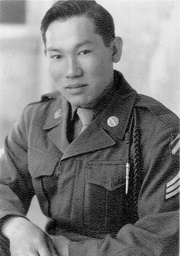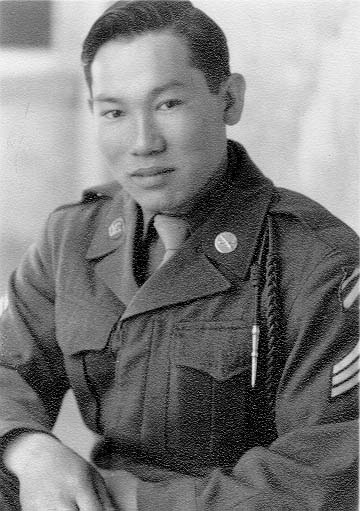
Japanese American Military Experience Database

Naomi Neil Ogimachi
Gender
Male
Birth date
1925-10-20
Place of birth
Los Angeles CA, U.S.A.
Inducted
1944-7-31, Manzanar CA
Enlistment type
Draftee
Service branch
Army
Service type
War
Unit type
Support
Units served
Hdqr Co. 787th Tank Battalion; B Battery, 132nd Field Artillery Battalion, 36th Infantry Division; C Battery, 39th Field Artillery Battalion, 3rd Infantry Division.
Military specialty
Survey & Instrument Man
Stationed
Camp Hood, TX; Germany, England.
Separated
Camp Beale CA
Unit responsibility
Field artillery support
Personal responsibility
Survey and instrument man.
Awards, medals, citations (individual or unit)
European African Middle-Eastern Campaign Medal; Victory Medal; Army of Occupation Medal; Good Conduct Medal
Living conditions
Arrived European Theater of Operation 04/05/1945 via 60-ship convoy. Loaded into 40 & 8 boxcar and shipped to Veviers, Belgium. Slept on cots in old garages, prison, tents, schools. Moved to Munchen Gladbaca, Germany and then to Worms, Germany. Assigned to 787th Tank Battalion at war's end. Reassigned when 787th was to be deployed to the Pacific. Took sponge baths using helmet as wash basin. Had lots of C and K rations and corned beef.
Most vivid memory of military experience
I spent the last 5 months in the Army in charge of the police and prison office (front gate) of Civilian Internment Enclosure 91 in Darmstadt, Germany. We had 25,000 war criminals in the camp, over half being Gestapo. The camp was divided into 5 sub-camps. Each had a GI liaison person who reported to me. The prisoners were counted twice a day during the week and once on weekends. Inside the camp, the prisoners cared for themselves as we did when we were in camp. The Army supplied the food. We did not fear for our safety in the camp as the war was over. I had a prisoner as an interpreter who was a corporal in the S.A. of brown shirts.. We had long discussions on Germans and Nazis. I learned about the German mentality from him.
Missed most whilst in the military
Fresh food, especially eggs and veggies. Although never segregated, we were not 100% assimilated as we were reassigned and kept track of because of our ancestry.
Most important thing, personally, to come from military experience?
War does not solve any problems. It destroys civilization and the works of mankind. I was accepted into all the units and I served without prejudice. I was treated no differently than any other GI.
Additional information
There were about 25 Japanese Americans in our group of replacements. We trained in tank destroyers. We were split up and assigned to the four armies on the German front. Six of us went to the 7th Army. The Army kept track of us as we were among the first to be assimilated. It is ironic that I went from being guarded to guarding. Later on in 1950, I also worked for the US Navy making explosive parts for nuclear weapons. Japanese Americans have come a long way from the early days of WWII


